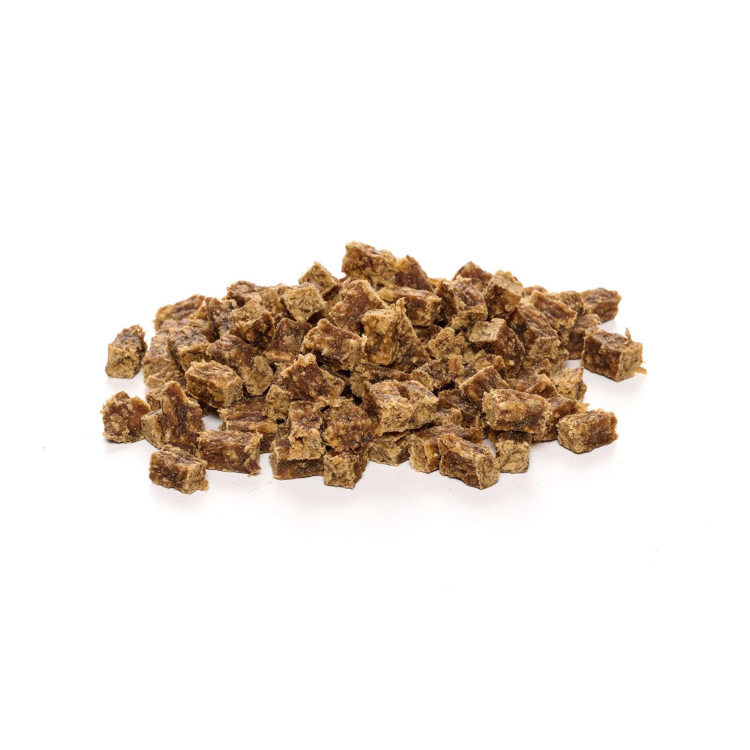
Why do dogs tremble?
Share
People shiver when they are cold, excited, nervous or afraid. Dogs are very similar to us in this respect. If your dog is shivering, you will understandably be concerned about his health, especially if the shaking and shivering occurs frequently.
The causes for this physical reaction are varied and often not particularly dramatic. It does not necessarily have to be caused by a serious illness, but it can be. It is therefore important to find out where the shaking is coming from, even if that is not always easy. In this article you will therefore receive detailed information on the topic of "shaking in dogs".
Content: Why do dogs tremble
- The dog is freezing - shivering from the cold
- Dog trembles with fear
- Joy as a trigger for trembling
- Trembling after movement and exertion
- Trembling in older dogs
- Vivid dreams
- Diseases in dogs - trembling or cramps
- Conclusion
Pamper your dog with our delicious chews!
The dog is freezing - shivering from the cold
Especially in winter, low temperatures can cause your dog to shiver all over; he is cold. Just like with people who shiver, muscle twitches cause the body temperature to rise again. How strongly and violently your four-legged friend shiver also depends on his body size. Smaller dogs get cold more quickly than large ones. In addition, certain breeds - hairless dogs and animals without an undercoat, such as Chihuahuas - tend to shiver in the cold. A suitable, warm coat for your dog, which you put on him when he goes for a walk , can help with this. Because the low temperatures can lead to hypothermia and colds, just like in humans.
Dog trembles with fear
As with humans, trembling is often an expression of fear and tension. Whether your dog is afraid is shown by his posture. If he not only trembles, but also crouches, lays his ears back, growls or even bares his teeth and pulls his tail between his legs, it is very likely that your loyal companion is afraid. Also pay attention to your dog's gaze. As a rule, smaller breeds are more fearful than larger ones - from their ground-level perspective, the environment often seems more threatening and their fear of survival is greater.
Most dogs are not born fearful. Often the owner unconsciously "trains" the dog to be afraid. Even if it is difficult and pitiful, if your dog is shaking with fear, do not comfort him. Stroking and calming him down will confirm his fear. Your behavior will make him believe that his fear was justified. It is better to act calm, self-confident and try to distract him. Your four-legged friend is a pack animal and pays close attention to your behavior in such situations. If he sees that you remain relaxed, he will usually calm down quickly.
If your dog is generally very anxious, this could be due to poor socialization. If you have a puppy, familiarize him with different situations that can trigger anxiety at an early stage. Also, keep confronting him with different stimuli such as strangers and animals, loud noises, traffic, etc.
Joy as a trigger for trembling
In contrast to fear, extreme, exuberant joy can also be a reason for your dog to tremble. He will also wag his tail, jump and prance, and some dogs will even urinate. If the animal then receives attention in the form of a snack or petting, this can reinforce his behavior. Some dogs even artificially induce the physical reaction in order to receive rewards. If you want your four-legged friend to unlearn this behavior, you should no longer give him treats or cuddles when he is trembling. Only reward your dog when he has calmed down again.
Trembling after movement and exertion
After long walks, fast running or extensive wrestling with playmates, your dog may experience muscle tremors. This is a natural shaking effect that serves to relax the muscles and reduce stress. This type of tremor can occur during sleep, but also when your dog is awake.
Sometimes the shaking is caused by a short-term hypoglycemia. You could then give your four-legged friend chews such as strips of meat , for example chicken, beef or lamb, which are high in protein and provide sustained energy. A small amount of honey could also help to raise the blood sugar level quickly. If the shaking occurs very frequently and continuously, you should see your vet. Note: Some dogs, especially hunting dogs such as terriers , may also shake when excited, for example when they see a cat. These four-legged friends are constantly "on edge".
- Chews made from dried chicken , beef or lamb could help
- Beef ears or pig ears would be an option
- A small amount of honey could quickly raise blood sugar levels
- If shaking occurs frequently and continuously, you should consult a veterinarian
Reward your best friend with our dog treats!
Trembling in older dogs
Your faithful companion is also getting older and may already be a little "rickety". Older dogs can therefore suddenly twitch or shake; the muscle twitches then occur spontaneously for no apparent reason. This is then completely normal and simply part of the "senior life" of your four-legged friend. These elderly four-legged friends simply need the right care for senior dogs .
Vivid dreams
You've probably noticed this before: After a particularly action-packed day, your dog trembles in his sleep. He's probably having a vivid dream and is perhaps chasing his favorite toy . He's in the deep sleep phase with audibly deeper breathing and twitching lips. Sometimes your four-legged friend also squeaks, growls or hums. This is how he processes his experiences. In this case, the trembling is completely harmless and no cause for concern. As a sign of extreme relaxation, it helps the dog relieve stress and the trembling stops when the dream is over.
Diseases in dogs - trembling or cramps
Most of the time, the reasons for a dog shaking are harmless. However, when it comes to the health of your furry friend, you should be able to recognize serious illnesses or injuries. It is important to distinguish between harmless shaking and serious seizures.
When your dog has a cramp, he seems absent and no longer has control over his body. This condition can sometimes last for minutes. When your dog is shaking, however, he is responsive. You can tell this, for example, by the fact that he reacts to you and tries to look you in the eyes. In other words, he is fully conscious.
If, in addition to the shaking, other symptoms such as vomiting, fever, lethargy or apathy and/or diarrhea occur, you should definitely take your dog to the vet. Unfortunately, in some cases the shaking can also have serious causes.
epilepsy
If your dog suffers from epilepsy, he will have a seizure that causes him to lose control of his body. This condition is not only bad for your four-legged friend, it can also be quite frightening for you. The seizure usually lasts for a long time and is responsible for increased shaking, especially in the dog's limbs.
About 2% of all dogs suffer from this type of neurological brain disease. Breeds such as beagles , German shepherds , golden retrievers , Bernese mountain dogs and Labradors are more commonly, but still rarely, affected. Unfortunately, epilepsy cannot be cured, but the symptoms can be controlled and alleviated with the help of medication.
If a seizure lasts for a long time, it can become life-threatening for the dog. The vet can stop the symptoms of epilepsy with special medication. It is also important to rule out causes such as tumors, deformities or injuries as triggers for the epileptic seizure.
Gastric torsion
Especially with large dogs and breeds such as Dobermans or Great Danes , the dog's stomach can twist around its longitudinal axis. Gastric torsion is life-threatening if not treated immediately. In addition to the tremors caused by pain and shock, the following symptoms occur: gagging, but without vomiting, a very bloated stomach, restlessness and circulatory problems. The likelihood of gastric torsion increases if you feed your four-legged friend large amounts of dry food . This is because this food usually contains a high grain content , which then swells up in the stomach. We therefore recommend that you let your dog rest for about one to two hours after feeding before you physically exert him.
distemper
Distemper is a dangerous viral disease. Among other things, the viruses damage your four-legged friend's brain, which can also lead to seizures. The other symptoms are varied and often difficult to identify. Nasal discharge, vomiting, diarrhea, paralysis, shortness of breath, loss of appetite or coughing often occur. Distemper can cause permanent damage to the respiratory tract, nervous system and digestive tract - the infection is often fatal. If you suspect distemper, take your dog to the vet immediately! However, distemper is relatively rare these days and you can and should have your dog vaccinated against it. The virus is transmitted via the excrement of infected animals - so you should always make sure that your dog does not eat feces !
White Dog Shaker Syndrom
The "White Dog Shaker Syndrome" is a hereditary disease that - as the name suggests - only occurs in white dogs, especially West Highland White Terriers . Affected animals tremble all over their bodies and shake, they are often disorientated and have rapid eye movements. The shaking syndrome is treated with medication. Sometimes the symptoms disappear completely, but there are also dogs that suffer from it for life and have to take medication.
poisoning
Dogs often tremble when they have been poisoned. In the worst case, poisoning affects your four-legged friend's entire body. Possible symptoms that may indicate poisoning are vomiting, diarrhea, fever, excessive salivation, abdominal cramps, cardiovascular problems, shortness of breath and general restlessness. If you want to prevent your dog from poisoning itself, keep it on a leash when you go for a walk, especially in the dark when you cannot see what it is finding and eating.
Tip: Do special anti-poison bait training with your dog. If you notice signs of poisoning in your dog, see a vet immediately.
Kidney failure leads to tremors
Trembling can be a sign of kidney failure in your four-legged friend, which is accompanied not only by pain but also by other serious symptoms such as diarrhea, apathy and vomiting. Kidney failure is life-threatening and requires immediate action. If your dog is trembling, perhaps even howling or whining, and also has symptoms such as abdominal pain due to digestive problems, you should not hesitate to take him to the vet or a veterinary clinic immediately. There, the vet can diagnose serious illnesses and take appropriate measures.
Conclusion
Dogs sometimes tremble, and you've probably noticed this in your four-legged friend before. There are many different reasons for this, and they're often harmless. However, the trembling can also have more serious or even life-threatening reasons and indicate, for example, a dog illness or acute pain. If you know your four-legged friend's character and habits well, you can more easily classify the trembling and judge whether a visit to the vet is in order. If in doubt, always go for it!
Reward your best friend with our dog treats!












